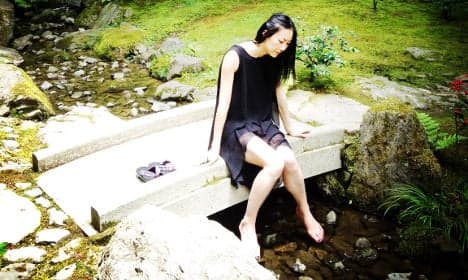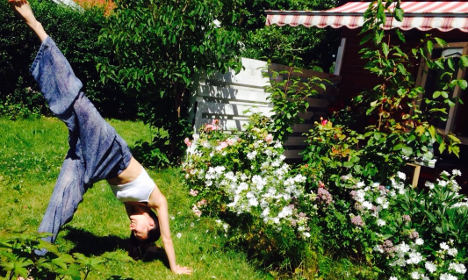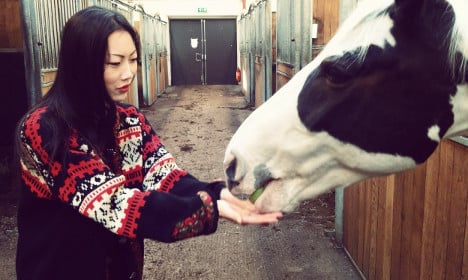'I thought to myself: what have I done with my life?'

In this week's My Swedish Career feature, Chen Zijia Pennie from China tells The Local of how she moved to Stockholm to work as a teacher – and ended up learning a lot about herself in the process.
Chen Zijia Pennie knows all about contrast. She can tell you stories about her first encounter of wild bird song after a lifetime surrounded by concrete, about living for the sake of your own humanity rather than for your career, and about moving to the other side of the world... only to find you feel at home.
The teacher first arrived in Sweden seven years ago to study a masters programme in outdoor environmental education and outdoor life at Linköping University. The central Swedish town proved to be a far cry from the hustle and bustle of her home town of Shanghai, one of the world's biggest cities by population.
For the purposes of comparison: Linköping has just over 150,000 residents. Shanghai some 24 million.
“The university tutors took us out on excursions. I had never slept outside in the forest before and the first time was scary but amazing. And I keep thinking 'it's so beautiful', even today. That Swedish saying is true that there is no bad weather, only bad clothes," laughs Pennie.
“My teachers were 60 years old and they were so much stronger than I was. I had grown up with concrete, boxes, machines, noise – a completely different environment. I was 23 at the time and I thought to myself: 'what have I done with my life?'”

Chen Zijia Pennie loves the Swedish nature. Photo: Private
But curiously, rather than being frightening and unfamiliar, she says the new experience felt like coming home. So much so that the 30-year-old – who is not afraid of making a leap of faith – has since chosen to surrender her Chinese passport in favour of a Swedish one.
“I always felt I didn't fit in back in China. But it's really weird, you end up feeling confused about your identity. I've tried to adapt to Swedish society, learning the language and so on, so whenever I go back to Shanghai now it's…weird. There's so much stress and noise, and I've become used to the calm in Sweden,” she says.
The teacher still visits her family and friends back in Shanghai twice a year. But the age-old expatriate tale of struggling to understand who you are when you have your feet in two different worlds is always there.
"I became more interested in my own background and got another perspective every time I came back after many years in Sweden and in some ways I'm struggling to find my lost identity especially the language, culture part. I'm still very Chinese in many ways."

Chen Zijia Pennie has lived in Sweden since 2008. Photo: Private
Sweden's labour market is notoriously difficult for foreigners to break into, with many employers requiring near-perfect Swedish skills – and that is just after you have delved through the mountain of bureaucracy.
It was no different for Pennie. But she is more keen to enjoy the present than to dwell on past obstacles.
“My current employers are very understanding and I appreciate their approach very much. They didn't care as much as others that my Swedish wasn't perfect from the start. But I got better and better at it for each working day,” she says in her now fluent Swedish.
Today, Pennie works with children at a pre-school on Stockholm's Södermalm island. She and her colleagues use the Reggio Emilia approach to teaching, which focuses on helping children explore their individuality through the principles of respect and discovery.
“My employers always think of what is best for the children, which I like. In general, China is completely different to Sweden. There's so much competition and it is hard both for adults and children. Everybody has to be smart. Children are raised as robots. I don't like that,” she says.
“In Sweden there is more focus on equality, gender and social life – you ask 'how can you learn to live as a human?' I think it is important that the children get a good foundation and get to experience things as a human first. The children get to choose for themselves what they want to do with their lives.”
The same applies to adults, she says. And Pennie has made full use of the famous Swedish focus on work-life balance – whether it is learning new snow sports to get her through the long Nordic winter or taking part in artistic dance performances.
And she has no plans to leave her adopted country any time soon.
"I like Sweden very much. I'm proud of it. It's a small country that has a lot of great things with a lot of great people. And everything feels so free here."
Comments
See Also
Chen Zijia Pennie knows all about contrast. She can tell you stories about her first encounter of wild bird song after a lifetime surrounded by concrete, about living for the sake of your own humanity rather than for your career, and about moving to the other side of the world... only to find you feel at home.
The teacher first arrived in Sweden seven years ago to study a masters programme in outdoor environmental education and outdoor life at Linköping University. The central Swedish town proved to be a far cry from the hustle and bustle of her home town of Shanghai, one of the world's biggest cities by population.
For the purposes of comparison: Linköping has just over 150,000 residents. Shanghai some 24 million.
“The university tutors took us out on excursions. I had never slept outside in the forest before and the first time was scary but amazing. And I keep thinking 'it's so beautiful', even today. That Swedish saying is true that there is no bad weather, only bad clothes," laughs Pennie.
“My teachers were 60 years old and they were so much stronger than I was. I had grown up with concrete, boxes, machines, noise – a completely different environment. I was 23 at the time and I thought to myself: 'what have I done with my life?'”

Chen Zijia Pennie loves the Swedish nature. Photo: Private
But curiously, rather than being frightening and unfamiliar, she says the new experience felt like coming home. So much so that the 30-year-old – who is not afraid of making a leap of faith – has since chosen to surrender her Chinese passport in favour of a Swedish one.
“I always felt I didn't fit in back in China. But it's really weird, you end up feeling confused about your identity. I've tried to adapt to Swedish society, learning the language and so on, so whenever I go back to Shanghai now it's…weird. There's so much stress and noise, and I've become used to the calm in Sweden,” she says.
The teacher still visits her family and friends back in Shanghai twice a year. But the age-old expatriate tale of struggling to understand who you are when you have your feet in two different worlds is always there.
"I became more interested in my own background and got another perspective every time I came back after many years in Sweden and in some ways I'm struggling to find my lost identity especially the language, culture part. I'm still very Chinese in many ways."
Chen Zijia Pennie has lived in Sweden since 2008. Photo: Private
Sweden's labour market is notoriously difficult for foreigners to break into, with many employers requiring near-perfect Swedish skills – and that is just after you have delved through the mountain of bureaucracy.
It was no different for Pennie. But she is more keen to enjoy the present than to dwell on past obstacles.
“My current employers are very understanding and I appreciate their approach very much. They didn't care as much as others that my Swedish wasn't perfect from the start. But I got better and better at it for each working day,” she says in her now fluent Swedish.
Today, Pennie works with children at a pre-school on Stockholm's Södermalm island. She and her colleagues use the Reggio Emilia approach to teaching, which focuses on helping children explore their individuality through the principles of respect and discovery.
“My employers always think of what is best for the children, which I like. In general, China is completely different to Sweden. There's so much competition and it is hard both for adults and children. Everybody has to be smart. Children are raised as robots. I don't like that,” she says.
“In Sweden there is more focus on equality, gender and social life – you ask 'how can you learn to live as a human?' I think it is important that the children get a good foundation and get to experience things as a human first. The children get to choose for themselves what they want to do with their lives.”
The same applies to adults, she says. And Pennie has made full use of the famous Swedish focus on work-life balance – whether it is learning new snow sports to get her through the long Nordic winter or taking part in artistic dance performances.
And she has no plans to leave her adopted country any time soon.
"I like Sweden very much. I'm proud of it. It's a small country that has a lot of great things with a lot of great people. And everything feels so free here."
Join the conversation in our comments section below. Share your own views and experience and if you have a question or suggestion for our journalists then email us at [email protected].
Please keep comments civil, constructive and on topic – and make sure to read our terms of use before getting involved.
Please log in here to leave a comment.